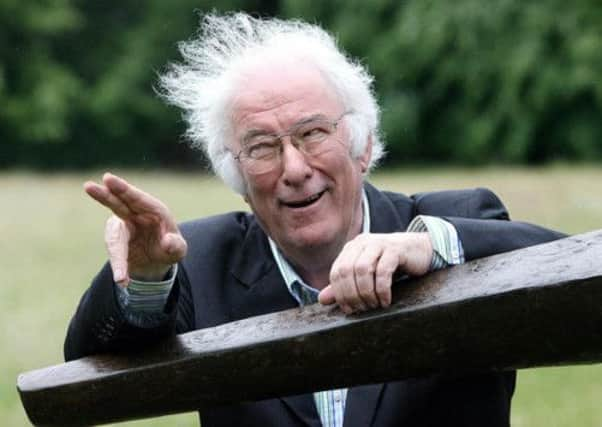Ireland mourns death of poet Seamus Heaney


The farmer’s son died in hospital in Dublin aged 74.
Friends, contemporaries, admirers and politicians revealed a humble, warm, funny and open man as tributes flowed in from around the world.
Heaney is survived by his wife, Marie, and children, Christopher, Michael and Catherine Ann.
Advertisement
Hide AdAdvertisement
Hide AdIrish Taoiseach Enda Kenny said it would take Heaney himself to describe the depth of loss Ireland would feel over his death.
“He is mourned – and deeply – wherever poetry and the world of the spirit are cherished and celebrated,” he said.
The 1995 Nobel prize-winner was born in April 1939, the eldest of nine children, on a small farm called Mossbawn near Bellaghy in Co Derry, Northern Ireland, and his upbringing often played out in the poetry he wrote in later years.
The citation for the award praised Heaney “for works of lyrical beauty and ethical depth, which exalt everyday miracles and the living past”.
Advertisement
Hide AdAdvertisement
Hide AdHis publisher Faber and Faber issued a statement on behalf of the family and went on to describe the poet as a world great and an inspiration for the company. “We cannot adequately express our profound sorrow at the loss of one of the world’s greatest writers,” a spokeswoman for Faber and Faber said.
“His impact on literary culture is immeasurable. As his publisher we could not have been prouder to publish his poetry over nearly 50 years. He was nothing short of an inspiration to the company, and his friendship over many years is a great loss.”
Heaney was educated at St Columb’s College, Derry, a Catholic boarding school, and later at Queen’s University Belfast, before making his home in Dublin, with periods of teaching in Oxford University and in the US, including at Harvard.
Heaney was an honorary fellow at Trinity College Dublin and last year was bestowed with the Seamus Heaney Professorship in Irish Writing at the university, which he described as a great honour. A year earlier he donated his manuscripts to the National Library of Ireland, a move which caused consternation in some academic circles In Belfast for overlooking his alma mater Queen’s.
Advertisement
Hide AdAdvertisement
Hide AdIn 1994, a year before he was elevated to the ranks of WB Yeats and Samuel Beckett with the Nobel award, Heaney was asked while teaching in Harvard if his poetry suffered as a result of academia. “For better or worse – I now feel for worse, earlier on I felt for better – I believed that poetry would come as a grace and would force itself through whenever it needed to come,” he said.
Poet Theo Dorgan said yesterday that poetry flowed into Heaney and through him, rather than being created.
Irish President Michael D Higgins said his contribution “to the republics of letters, conscience, and humanity was immense”.
“As tributes flow in from around the world, as people recall the extraordinary occasions of the readings and the lectures, we in Ireland will once again get a sense of the depth and range of the contribution of Seamus Heaney to our contemporary world, but what those of us who have had the privilege of his friendship and presence will miss is the extraordinary depth and warmth of his personality,” he said.
Advertisement
Hide AdAdvertisement
Hide AdMr Higgins, himself a published poet, described Heaney as warm, humourous, caring and courteous. “A courtesy that enabled him to carry with such wry Northern Irish dignity so many well-deserved honours from all over the world,” he said.
“Generations of Irish people will have been familiar with Seamus’ poems. Scholars all over the world will have gained from the depth of the critical essays, and so many rights organisations will want to thank him for all the solidarity he gave to the struggles within the republic of conscience.”
Heaney’s world renowned poetry first came to public attention in the mid-1960s with his first major collection, Death Of A Naturalist, published in 1966. He was made a Commandeur de L’Ordre des Arts et Lettres by the French Ministry of Culture in 1996.